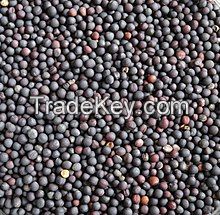
FOB Price
Obtener el precio más reciente230 ~ 330 / Ton
|Minimum Order
Place of Origin:
-
Price for Minimum Order:
Minimum Order Quantity:
10 Ton
Packaging Detail:
As a Customers' Requirement
Delivery Time:
10 to 20 days
Supplying Ability:
10000 Ton per Month
Payment Type:
T/T, Western Union, Money Gram, PayPal
Canada
Rapeseeds, also known as canola seeds, are the seeds of the rapeseed plant, scientifically known as Brassica napus or Brassica rapa. Here are some key points about rapeseeds:
Appearance: Rapeseeds are small, round seeds with a dark brown to black outer shell. They are typically harvested from the seed pods of the rapeseed plant.
Composition: Rapeseeds are rich in oil, which accounts for about *0% to *5% of their total weight. Rapeseed oil, also known as canola oil, is extracted from these seeds and is commonly used for culinary, industrial, and biofuel purposes. Canola oil is prized for its low levels of saturated fat and high levels of monounsaturated and polyunsaturated fats, particularly omega*3 and omega*6 fatty acids.
Culinary Uses: Canola oil derived from rapeseeds is a popular cooking oil known for its neutral flavor and high smoke point. It is commonly used for frying, baking, sauting, salad dressings, and marinades. Canola oil\'s mild taste allows the flavors of other ingredients to shine through, making it a versatile ingredient in a wide range of dishes.
Industrial Uses: In addition to its culinary uses, rapeseed oil is also used in various industrial applications, including lubricants, biofuels, and biodiesel production. Canola oil is a renewable and environmentally friendly alternative to fossil fuels, and its use as a biofuel has gained popularity in recent years due to its low carbon emissions and sustainability.
Health Benefits: Canola oil derived from rapeseeds is considered a heart-healthy oil due to its favorable fatty acid profile. It is low in saturated fat and high in monounsaturated and polyunsaturated fats, which have been shown to help reduce LDL (bad) cholesterol levels and lower the risk of heart disease when consumed as part of a balanced diet.
Safety Considerations: While rapeseeds themselves are safe for consumption, it\'s essential to note that some varieties of rapeseeds contain high levels of erucic acid and glucosinolates, which can be harmful if consumed in large quantities. However, modern varieties of rapeseeds, known as canola, have been selectively bred to reduce these harmful compounds to safe levels, making them suitable for human consumption.
